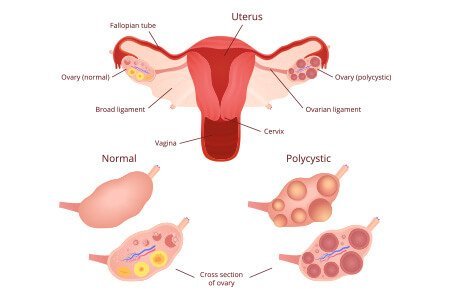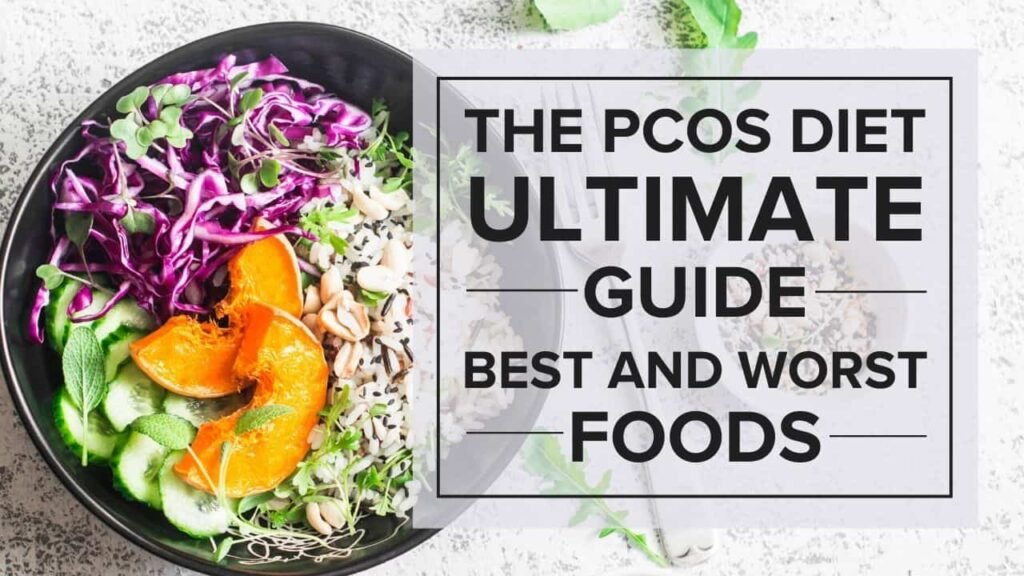What is pcos ?

PCOS (Polycystic ovary syndrome) is a condition in which women have an imbalance of reproductive hormones; often, the ovaries produce an excess of the male hormone, testosterone, and a lack of the female hormone, estrogen. The body doesn’t go through regular ovulation as a result, so the eggs that are not properly released each month often swell and cluster around the ovaries, forming cysts.
Polycystic ovary syndrome is a condition that causes hormonal imbalances and problems with metabolism.
Polycystic ovary syndrome (PCOS) is a common health condition experienced by one out of 10 women of childbearing age. PCOS can also lead to other serious health challenges, such as diabetes, cardiovascular problems, depression, and increased risk of endometrial cancer.
SYMPTOMS OF PCOS

Symptoms of PCOS often start around the time of the first menstrual period. Sometimes symptoms develop later after you have had periods for a while.
The symptoms of PCOS vary. A diagnosis of PCOS is made when you have at least two of these:
- Irregular periods. Having few menstrual periods or having periods that aren’t regular are common signs of PCOS. So is having periods that last for many days or longer than is typical for a period. For example, you might have fewer than nine periods a year. And those periods may occur more than 35 days apart. You may have trouble getting pregnant.
- Too much androgen. High levels of the hormone androgen may result in excess facial and body hair. This is called hirsutism. Sometimes, severe acne and male-pattern baldness can happen, too.
- Polycystic ovaries. Your ovaries might be bigger. Many follicles containing immature eggs may develop around the edge of the ovary. The ovaries might not work the way they should.
PCOS signs and symptoms are typically more severe in people with obesity.
What are the Causes of pcos/pcod ?
The exact cause of PCOS is not known but the Factors that might play a role include:
- Insulin resistance. Insulin is a hormone that the pancreas makes. It allows cells to use sugar, your body’s primary energy supply. If cells become resistant to the action of insulin, then blood sugar levels can go up. This can cause your body to make more insulin to try to bring down the blood sugar level.Too much insulin might cause your body to make too much of the male hormone androgen. You could have trouble with ovulation, the process where eggs are released from the ovary.One sign of insulin resistance is dark, velvety patches of skin on the lower part of the neck, armpits, groin or under the breasts. A bigger appetite and weight gain may be other signs.
- Low-grade inflammation. White blood cells make substances in response to infection or injury. This response is called low-grade inflammation. Research shows that people with PCOS have a type of long-term, low-grade inflammation that leads polycystic ovaries to produce androgens. This can lead to heart and blood vessel problems.
- Heredity. Research suggests that certain genes might be linked to PCOS. Having a family history of PCOS may play a role in developing the condition.
- Excess androgen. With PCOS, the ovaries may produce high levels of androgen. Having too much androgen interferes with ovulation. This means that eggs don’t develop on a regular basis and aren’t released from the follicles where they develop. Excess androgen also can result in hirsutism and acne.
What are the Complications in pcos

Complications of PCOS can include:
· Infertility
· Gestational diabetes or pregnancy-induced high blood pressure
· Miscarriage or premature birth
· Nonalcoholic steatohepatitis — a severe liver inflammation caused by fat buildup in the liver
·Metabolic syndrome — a cluster of conditions including high blood pressure, high blood sugar, and unhealthy cholesterol or triglyceride levels that significantly increase your risk of heart and blood vessel(cardiovascular) disease
· Type 2 diabetes or prediabetes
· Sleep apnea
· Depression, anxiety and eating disorders
· Cancer of the uterine lining (endometrial cancer)
How to treat pcos naturally?
Two of the primary ways that diet affects PCOS are weight management and insulin production and resistance.
However, insulin plays a significant role in PCOS, so managing insulin levels with a PCOS diet is one of the best steps people can take to manage the condition.
Many people with PCOS have insulin resistance. In fact, more than 50 percent of those with PCOS develop diabetes or pre-diabetes before the age of 40. Diabetes is directly related to how the body processes insulin.
Following a diet that meets a person’s nutritional needs, maintains a healthy weight, and promotes good insulin levels can help people with PCOS feel better.
Difference between PCOS and Menopause:
The following symptoms are specific to PCOS and do not present during perimenopause:
- Acne And Other Skin Issues
- Pelvic Pain
- Headaches
The following symptoms are specific to perimenopause and are absent from PCOS:
- Hot Flashes
- Night Sweats
- Painful Or Uncomfortable Sex
- Urine Leaks
- Urinary Tract Infections
- Dryness And Weakening Of Tissue In The Vagina
- Changes In Sex Drive
Both illnesses’ symptoms will appear simultaneously in perimenopausal PCOS women.
Foods to eat in PCOS

The following healthy foods can lower inflammation, keep blood sugar levels in check, and help you maintain a healthy weight to mitigate the side effects of gut issues and other uncomfortable manifestations of PCOS.
FIBER
A high-fibre diet offers many benefits to women with PCOS, such as lower insulin levels, and antioxidants which fight to lower inflammation, and better gut bacteria .
Examples -:
- Seeds (chia, flax, sunflower seeds)
- Legumes (black beans, lentils, chickpeas)
- Berries (raspberries, blackberries, blueberries)
- Whole Grains (bulgur, quinoa, brown rice, whole oats)
LEAN PROTEIN
Eating more lean protein (as opposed to meat that’s higher in saturated fat, like red meat and cured meats) may help weight loss, as well as keeping you fuller for longer.
Examples -:
- Fish (salmon, shrimp, tuna, cod)
- Lean poultry (skinless chicken and turkey)
- Plant protein sources (beans, peas, tofu, tempeh)
ANTIOXIDANT-HEAVY FOODS
Women with PCOS have been shown to have low-grade inflammation; elevated inflammatory signals can raise insulin, contributing to worsening of PCOS symptoms. The best inflammation-fighting antioxidant-filled foods include fruits, vegetables, whole grains, and unsaturated fats.
Examples-:
- Fruits (strawberries, blueberries, raspberries )
- Vegetables (spinach, artichokes, kale)
- Whole Grains (whole oats, whole wheat, quinoa, brown rice)
- Unsaturated fats (nuts like pecans, nut butters, olive oil, avocado)
FOODS WITH ORGANIC WHOLE SOY
Soy may increase the chances of getting pregnant. “Organic whole soy has been shown to improve fertility in PCOS women ,But it must be organically produced and not highly processed.
Examples -:
- Miso
- Edamame
- Tempeh
FOODS COMPLIANT WITH THE MEDITERRANEAN DIET
Examples-:
- All fruits and vegetables
- Seafood (shrimp, salmon, tuna, sea bass)
- Whole Grains (brown rice, quinoa, couscous)
- Healthy Fats (olive oil, plain, unsalted nuts, avocado)
FOODS COMPLIANT WITH THE DASH DIET
The DASH diet, originally designed for controlling high blood pressure, can also be beneficial to patients with PCOS in managing lower levels of insulin. It mainly focuses on healthy carbs, like fruits, vegetables, and whole grains. Due to the presence of fiber, whole grains minimize spikes in your blood sugar and insulin levels. Individuals who are insulin sensitive are able to better manage their weight and experience a reduced risk of diabetes, heart disease, and stroke.
Examples:-
- All fruits and vegetables
- Whole Grains (brown rice, quinoa, whole wheat)
- Poultry and fish (chicken, turkey, salmon)
- Legumes (peanuts, chickpeas, peas)
- Nuts and seeds (walnuts, pecans, flaxseeds, sunflower seeds)
FOODS TO AVOID ON A PCOS DIET
When you’re eating to alleviate PCOS symptoms, you’ll want to avoid the following foods that can spike blood sugar, increase inflammation, and cause weight gain.
REFINED CARBS
Women with PCOS do not typically process carbohydrates correctly (because of their high levels of insulin, in most cases). Limiting carbohydrates, especially refined, nutrient-void carbohydrates, can lead to weight loss, which in turn decreases androgen levels responsible for acne, abnormal hair growth, and anovulation, or an irregular menstrual cycle.
Examples :
- White bread
- Pizza dough
- Regular pasta
- White rice
SUGARY BEVERAGES
Though you may think juice and smoothies are healthy, some pre-bottled options can contain close to 30 grams of sugar and will spike your blood sugar, a problem if you have high insulin levels to begin with. It’s best to stay away from concentrated sweets and sugars, like fruit juice—instead, choose natural sugars like fruits. “These are higher quality carbohydrates, and therefore are higher in fiber.”
Examples :
- Soda
- Fruit juice
- Bottled smoothies
- Cold-pressed juices
SUGARY, PROCESSED FOODS
Along with sugary beverages, sugary foods are not much better for the PCOS diet. all processed foods, many containing harmful chemicals, not only are poor for weight loss but can also destroy the gut microbiome. Instead of packaged foods, choose farm-to-table, whole foods.
Examples :
- Cakes, candy, cookies, and other sweets
- Sweetened cereals
- Yogurts with added sugar
- Ice cream with excess added sugar or sugar substitutes
SATURATED AND TRANS FATS
Saturated fats, found in foods like overly processed meats, aren’t beneficial for weight loss or a healthy balanced diet. Additionally, these high-fat foods can also be problematic for PCOS patients. It’s much better to focus on healthy fats, as in the Mediterranean diet (and you can have as much whole grain avocado toast as you want).
Examples :
- Saturated fats (red and processed meats like fast food hamburgers)
- Trans fats (doughnuts, French fries, frozen pizza)
DAIRY, IN SOME CASES
According to research published in the International Journal of Preventive Medicine, reducing dairy intake could potentially help certain women with PCOS lose weight and help some of their hormonal PCOS symptoms. Some patients (perhaps if they have gut issues linked to a dairy intolerance) can benefit from starting out with cutting back on dairy or even a vegan diet. But other patients, if they have no sensitivity or intolerance to dairy, have no reason to eliminate it from their diet—especially if they need the calcium and Vitamin .
Greek yogurt as opposed to sugary options like a candy-topped yogurt.
Examples :
- Artificial or heavily processed cheeses
- Yogurts with added sugar
- Ice creams with sugar alcohols or tons of added sugar
ALCOHOL
Women with PCOS have high rates of fatty liver, which is only diagnosed with an ultrasound. Alcohol is a direct toxin to the liver and gut microbiome. An European Journal of Endocrinology study states that lifestyle changes, particularly maintaining a balanced diet, is the best way to manage fatty liver in conjunction with PCOS.
Examples :
- Cocktails made with sugary mixers like juice or bottled mixers
- Canned cocktails
Other lifestyle changes
Lifestyle changes can also help people with PCOS manage the condition. Research has shown that combining a PCOS diet with physical activity can lead to the following benefits:
- weight loss
- improved insulin metabolism
- more regular periods
- reduced levels of male hormones and male-pattern hair growth
- lower cholesterol levels
